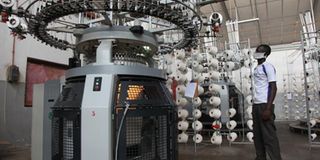Prime
Nytil is moving up the textile ladder after a turbulent past

A Nytil employee in the spinning section of the factory. The factory was taken over by its present owners in March 1996. PHOTO BY STEPHEN WANDERA
What you need to know:
Established. The textile maker was founded in 1954.
Jinja. Southern Range Nyanza, also known as Nytil, is still active in the textile manufacturing business.
Despite inheriting a dysfunctional plant 20 years ago, the story of the country’s oldest textile factory seems to have taken a turn for the better.
“Many people believe Nytil is not there yet that is not true,” Nytil general manager, Vinay Kumar, said in an interview recently.
He continued: “We have three shifts. We employ nearly 1,500 people, most of whom are women. We produce 18,000 T-shirts per day and we are the major suppliers of uniforms of armed forces in the region, among other whole range of products.”
When it was taken by the new investor, about $31m (Shs103b) was injected into the revival of the plant.
About $5m (Shs16.7b) has been invested in the operation and processes of the factory, with about $2m (Shs6.6b) of that being used in purchasing modern facilities before the close of the year.
Although strange, Uganda imports armed forces uniform from Asia yet Nytil has the facilities and capacity to do that.
Nytil was taken over by the present owners in March 1996. According to the corporate affairs director, Mr Richard Mubiru, the textile plant that started operating shortly before Uganda got independence, was as good as dead when it exchanged hands then.
Speaking in an interview recently, he said: “When it was taken over it was completely run-down. It was typical of a parastatal as we know it with laissez-faire management.”
Laissez-faire is a French word meaning ‘leaving alone’.
In this case, it refers to a policy or attitude of letting things take their own course, without interfering.
Mr Mubiru continued: “For example, by the time of the takeover, the people who were on the previous payroll were 6,800. Today they are less than that number but in terms of contributing to the turnover growth, they are 10 times better than the 6,800.”
He said the total investment that has so far been injected in the last few years is in excess of Shs60b. And this is so because they are here for a long haul and want to fully modernise the plant to the required level.
“Compared to where it was when it was taken over, we have turned it round even in terms of product mix and range. Before Nytil was not doing garment. It was doing the traditional Khaki and Jinja (cotton clothes). When we took over, we put in modern tailoring machines and even started manufacturing T-Shirts, all these range of products are the new effort that has come in,” Mr Mubiru said.
Production capacity
In addition to the 18,000 T-shirts made per day, the factory also processes 100,000 metres of fabrics as well as giving it colour of different shades and finishing.
The plant has a spinning capacity of eight tonnes per day while weaving is at nearly 100,000 metres per day.
And of the 150,000 bales produced, only 15,000 is consumed locally, something the industry player wants changed by implementing policies that will see Ugandans give preference to locally manufactured products as opposed to craving for imported textiles, most of which, are second hand used clothes.
They also want used or second- hand clothes banned for it has an impact on consumption of locally- made textile products, which directly threatens survival of textile manufacturers such as Nytil.
Industry reports indicate that about 80 per cent of textiles, particularly clothes, are imported.
If this is not dealt with, it will not take long for the livelihood of about 2.5 million people engaged in the sector to deteriorate further than it is the case now.
According to Mr Mubiru, energy consumes the most cost in the textile business.
Whereas in Asia it is far cheaper, in Uganda, he says, the cost is prohibitive.
The private sector leadership, particularly the Uganda Manufacturers Association, have on numerous occasions, said the high cost of power is responsible for their meek competitiveness, giving way to Asian-based products, thanks to cheaper production costs, to flood the local market.
To minimise the shock, the industry players want government to start by stopping the importation of armed forces uniform for the locally manufactured ones - after all, the capacity to do that is already available.
Founded in 1954, Nytil is Uganda’s largest integrated textile industry, with a modernised plant.
Nytil targets a $50m (Shs167b) turnover this year up from $40m (about Shs133b).
Capacity
In Nytil, the country has one of the largest integrated mills in the East African region, which performs all technical processes on a textile, right from fibre preparatory processes, including spinning to garment construction with the state-of-the-art equipment.
According to the Uganda National Bureau of Statistics, in the 2014 the country produced 12,700 tonnes, registering reductions of 32 per cent from the previous year’s production which was 18,671 tonnes.
Cotton earnings decreased from $31.7m (Shs106b) during 2013 to $21.9m (Shs73b) in 2014.




